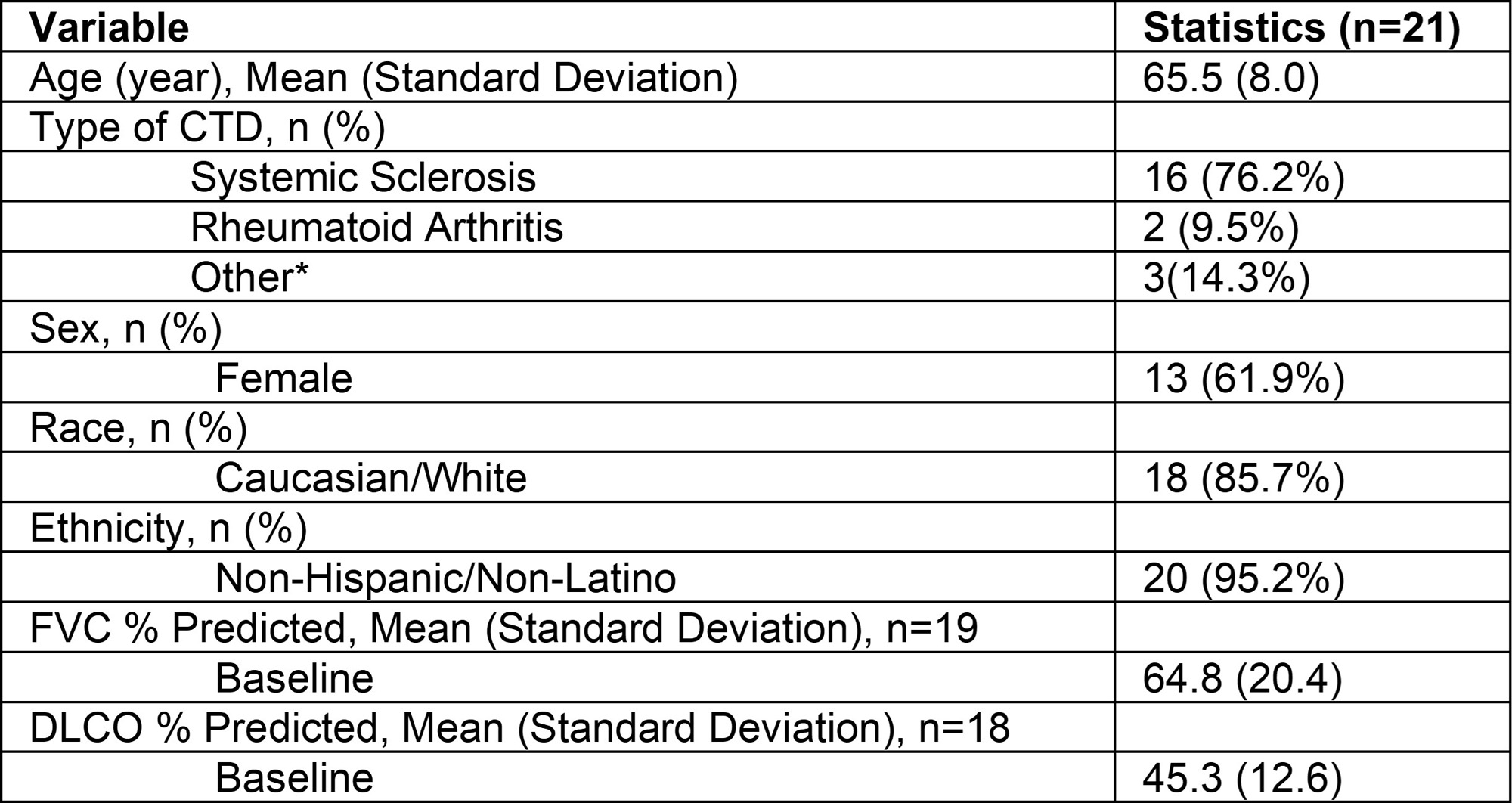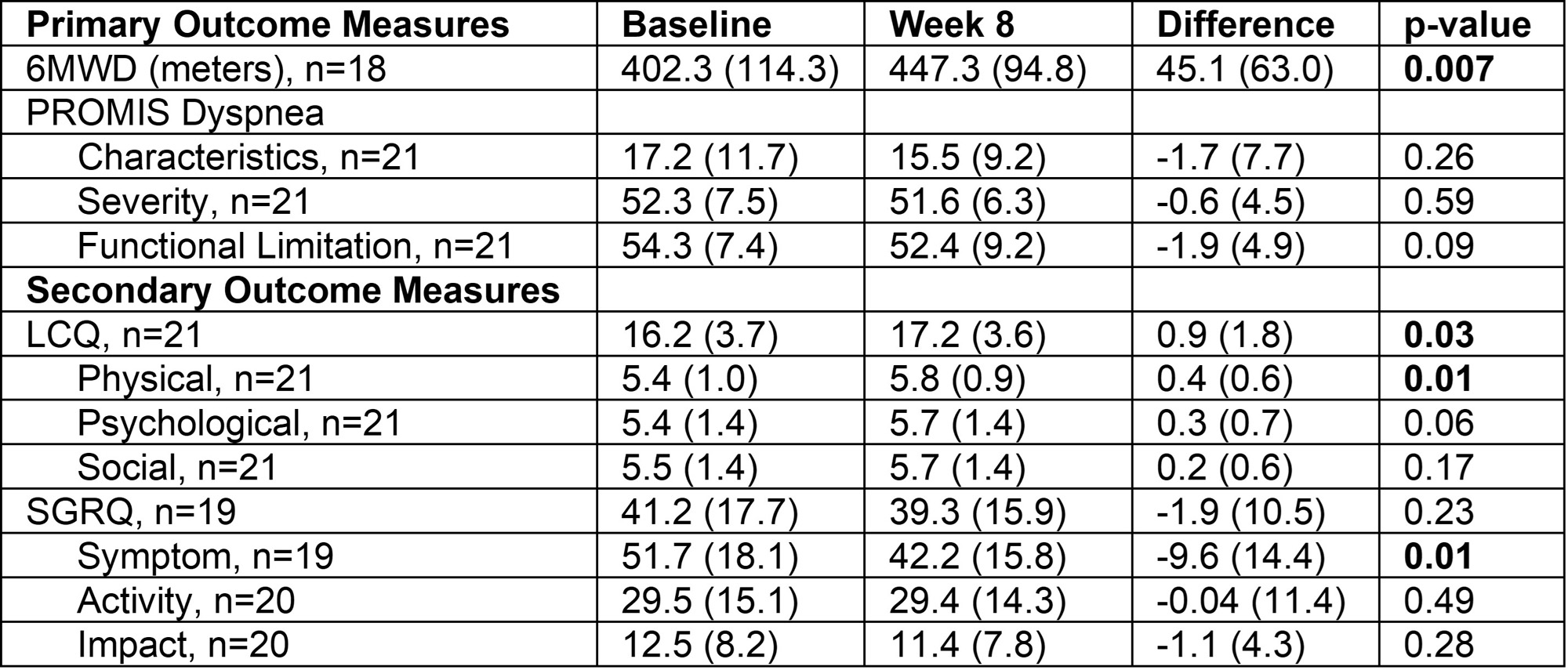Session Information
Date: Sunday, November 12, 2023
Title: (0609–0672) Systemic Sclerosis & Related Disorders – Clinical Poster I: Research
Session Type: Poster Session A
Session Time: 9:00AM-11:00AM
Background/Purpose: Interstitial lung disease (ILD) is a common manifestation of connective tissue disease (CTD)1. Pulmonary rehabilitation (PR) can be utilized to improve dyspnea and quality of life in patients with chronic lung conditions, including both obstructive and restrictive lung diseases2. This study aims to determine if PR can be a useful therapy to improve dyspnea and hall walk in CTD-ILD.
Methods: Patients at a tertiary center who were referred to PR rheumatology as the standard of care were enrolled in this study. To determine the outcomes of patients who underwent PR, pulmonary function tests (PFTs), 6-minute walk test (6MWT), and patient-reported outcomes (PROs) including PROMIS Dyspnea, St George Respiratory Questionnaire (SGRQ), and Leicester Cough Questionnaire (LCQ) were collected before and at 8 weeks after PR. 21 patients were included in the data analysis. P< 0.05 was considered statistically significant.
Results: The baseline characteristics are shown in Table 1. Following PR, there was a statistically significant improvement in 6MWT (Table 2). Improvement in scores was observed in LCQ and the symptom domain of the SGRQ. Trends were noted in PROMIS Dyspnea scores.
Conclusion: In CTD-ILD patients, an 8-week course of PR led to improvements in functional capacity (6MWT) and certain quality of life domains (LCQ and symptom domain of SGRQ). Future studies are required to determine the longer-term benefit of PR in CTD-ILD patients and if these improvements are sustained.
References:
1. Wallace B, Vummidi D, Khanna D. Management of connective tissue diseases associated interstitial lung disease: a review of the published literature. Curr Opin Rheumatol. 2016 May;28(3):236-45. doi: 10.1097/BOR.0000000000000270. PMID: 27027811; PMCID: PMC4826478.
2. Nolan CM, Polgar O, Schofield SJ, Patel S, Barker RE, Walsh JA, Ingram KA, George PM, Molyneaux PL, Maher TM, Man WD. Pulmonary Rehabilitation in Idiopathic Pulmonary Fibrosis and COPD: A Propensity-Matched Real-World Study. Chest. 2022 Mar;161(3):728-737. doi: 10.1016/j.chest.2021.10.021. Epub 2021 Oct 23. PMID: 34699771; PMCID: PMC8941605.
To cite this abstract in AMA style:
Gedert R, Huang S, Sabbagh M, McInroy M, Huang S, Khanna D, Nagaraja V. Pulmonary Rehabilitation in Connective Tissue Disease-Related Interstitial Lung Diseases [abstract]. Arthritis Rheumatol. 2023; 75 (suppl 9). https://acrabstracts.org/abstract/pulmonary-rehabilitation-in-connective-tissue-disease-related-interstitial-lung-diseases/. Accessed .« Back to ACR Convergence 2023
ACR Meeting Abstracts - https://acrabstracts.org/abstract/pulmonary-rehabilitation-in-connective-tissue-disease-related-interstitial-lung-diseases/


